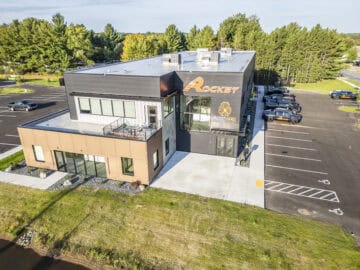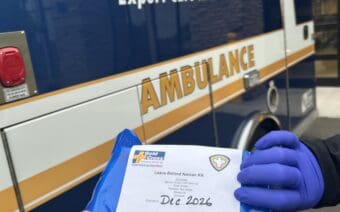
July 29, 2024
PLYMOUTH – A Sheboygan County man who saw first-hand the effects of war decided he had to do something about it.
Torre Willadsen worked as a military department defense contractor who trained bomb dogs, and their handlers, for the military.
“The first class I had was with the Marine Corps,” he said. “I trained the dogs, then I trained the Marines who handled the dogs and then I deployed with the Marines to Afghanistan in 2012.”
During his time with the 7th Marines, Willadsen said he developed close bonds with both dogs and their handlers – and at times witnessed significant injuries to some of the troops, including Chris Van Etten.
Willadsen said Van Etten was gravely injured when he and his fellow Marines ran into a daisy chain IED while on a night patrol.
Daisy chain IEDs, he said, are improvised explosive devices linked together to cause maximum damage when detonated.
Willadsen said Van Etten, who didn’t have his dog with him that night, lost both his legs in the incident, as did a second Marine, while two others were killed.
Following that attack, Willadsen said he worked hard to help keep Van Etten and his dog, Harley, together during Van Etten’s long, challenging recovery.
“Besides the work the dogs did to keep the Marines safe by finding explosives, drugs and weapons, I saw what they did for the guys during the downtime – what they did overall for their morale,” he said. “It made me realize I needed to do something with dogs and veterans when I got home. I love dogs, and I love our military, so doing something to help both seemed like the thing to do.”
Willadsen said he decided to create a nonprofit that would train dogs, then gift them to retired veterans to serve as either a service dog, emotional support dog or simply a devoted companion animal, to help them cope with the rigors of re-entering society, while also dealing with their unique challenges from one day to the next.

The rest of his time in Afghanistan and after returning to the U.S., Willadsen said he used his experiences, expertise as a dog trainer and passion for the military to start building his business plans – ultimately launching Dogs2DogTags.
Dogs2DogTags (D2DT) was born
Today, located in Plymouth, Dogs2DogTags (D2DT) is a nationally-recognized nonprofit that creates an opportunity to save, train and place at-risk, rescued, surrendered or donated dogs with service members who have been diagnosed with post combat stress and anxiety.
The dogs, Willadsen said, are provided at no cost to veterans and dog training is offered free.
He also provides free dog training to veterans who may have their own dog, but want it trained as well.
No matter what role the dog plays, Willadsen said Dogs2DogTags helps veterans cope with their PTSD, depression or even thoughts of suicide, if they arise – as the D2DT’s tagline says: “saving our vets one dog at a time.”
Since opening its doors 12 years ago, Willadsen said D2DT has placed 35 dogs, the first one in approximately late 2015 or early 2016, the same year the organization got its 501(c)3 nonprofit status.
Initially, Willadsen said the organization placed dogs with vets in other states, as well as Wisconsin.
But when the COVID-19 pandemic happened, the operation did a bit of reorganization.
“When COVID hit, I wasn’t able to fly anywhere or go anywhere, really,” he said. “We then decided to make our focus closer to home. We’re in Sheboygan County, and we try to serve the community here as much as we can, then surrounding counties and the State of Wisconsin.”
Besides being founder and president, Willadsen is the only trainer at D2DT – which leaves him finding and evaluating dogs and caring for them.
His training credentials and background, however, he said, more than make up for his being the only trainer.
According to the D2DT website (dogs2dogtags.org), Willadsen has produced Department of Defense (DOD) canines for bomb detection; Homeland Security Search Dogs; TSA Bomb and Drug Search Canines; Special Forces dual- and single-purpose teams; and local and national police search units from Los Angeles to the Washington D.C. Capitol Police.
Willadsen said his qualifications include DOD certified dog trainer; Alcohol Tobacco and Firearms dog trainer, certified military Dog Trainer; DOD K-9 handler trainer; certified drug and explosive K-9 handler; and police K-9 handler.
He said he has also mentored under the best hunt test, field trial, military working dog and master trainers in the country.
Besides providing veterans with a dog, Willadsen said Dogs2DogTags has a grant program called Laikas Fund, which provides financial assistance for veterinary care to veterans who are at risk of losing their canine companion due to financial difficulties.
Dogs come from many sources
Willadsen said dogs come to D2DT in several ways.
Some, he said, are donated, while others come from rescue groups, humane societies and animal shelters – and some are owner-surrenders where, for whatever reasons, someone can no longer keep their dog.
If, upon evaluation, it seems like they’d be a good fit, Willadsen said D2DT takes the dog, no questions asked.
Any breed or mixed breed of dog, he said, can be used as a service dog, emotional support animal or companion animal.

However, Willadsen said not every dog will pass an evaluation or make it through the training to become a service dog.
“When we do an evaluation, we try to find the dogs we think have the best possibility to become a service animal,” he said. “But, in the service animal world, there is a 70% or higher rate of failure for a service animal nationwide. We’re always going for the final product being a service dog, but there’s a lot of veterans out there who just want a well-trained companion or emotional support dog. So, if a dog doesn’t pass the service animal test, we have plenty of applicants looking for the emotional support or companion dog.”
Once a dog passes that initial evaluation, Willadsen said several factors determine how long its training will take – depending largely on the dog’s age, its maturity level and what it’s being trained to do.
Willadsen said on average, training can be anywhere from 18 to 24 months.
“Some people approach us and say they’ve got a service dog that’s already been certified but whose owner has passed away and they’d like to pass the dog on to us,” he said. “That’s a quick turnaround.”
Though D2DT trains the dogs, Willadsen said he isn’t an animal behaviorist.
“We don’t change behaviors – we educate the dog into a social environment that’s going to be best for the dog and the veteran,” he said.
Dual evaluation
Willadsen said dogs aren’t the only ones getting evaluated for the program.
D2DT does extensive background checks on applicants.
In addition, Willadsen said he talks to relatives and neighbors to find out what an applicant’s lifestyle is like and where they live – a city, town or some area in the country.
He said he also sees if an applicant has children and, if so, how many and their ages and what their life’s schedule is like – whether they’re active or not, and so on.
“There’s a lot of work that goes into a veteran and a dog placement,” Willadsen said, noting it’s important to match the right dog with the right veteran for the best success.
D2DT, Willadsen said, gets far more applicants than it could ever provide dogs for.
“We vet people to see how interested they will stay with us because the last thing we want to do is place a dog with someone who is just feeling down and sad at the moment, but then summertime comes and they’re busy (and don’t have time for the dog),” he said.
Settling into a new home
Last September, Willadsen said D2DT broke ground on a building that now houses its office, training center and 12 dog runs/kennel, in addition to a large green space.
The organization recently celebrated the new building’s opening with an official ribbon cutting.
Though operations were down a bit due to construction, Willadsen said he thinks he’ll certify three dogs yet this year.
He said his goal next year – being fully up and running – is 10 dogs.
Two of the 12 kennels on-site, Willadsen said, are isolation kennels for dogs who haven’t yet been evaluated for potential medical issues.
Another two kennels, he said, are saved and used for the Wisconsin Department of Veteran Affairs.

“Some veterans (suffer with) big drug and alcohol problems,” he said. “As some may need to go to rehab, take care of other issues or have potential incarceration, or their reserve unit gets called up, they don’t want to (surrender) their dog or have nowhere for it to go. So, two kennels are set aside for those situations so we can help maintain their mental stability by knowing their dog is being taken care of, and they’re not going to lose it. That’s part of what we do with the (VA).”
At some point, Willadsen said he would like to also focus on mobility dogs – which will happen once he develops what he calls a Farm Team Kennel concept – a concept where D2DT has one group of dogs in the kennels waiting to go home to their assigned veterans; and another set of dogs in place waiting to meet their veteran owners and train with them.
“Instead of having to look for more dogs when existing ones go home to their vets, we already have another group coming right up behind them,” he said. “That allows us to start building into our program those young rescue dogs and younger dogs who are donated.”
In addition to him, Willadsen said D2DT has a paid executive director and about 20 volunteers.
He said he may have to hire a second trainer in the future.
D2DT is fully funded by donations from corporations, military-related organizations and individuals around the country.
Willadsen said he does not consider himself a hero but rather someone who is supporting the real heroes.
“I was blessed and honored to spend time with our real heroes, and I’m extremely grateful I can help vets with this program,” he said. “I’m… trying to do some good work to help our veterans who suffer both mentally and emotionally.”
Willadsen said he appreciates everybody who has helped D2DT get to this point and looks forward to the future.
“We’re trying to do the best we can for the veterans, the dogs and the community,” he said. “We hope to grow in a manner we can help a lot of veterans, a lot of dogs and a lot of families. We’ve often heard from people that (the dog’s presence in the home) has made the whole family unit better – and it’s saving lives.”
D2DT is located at N4717 County Road M in Plymouth.
 Mid-State Technical College takes tailored roadshow to employers, adults
Mid-State Technical College takes tailored roadshow to employers, adults ‘I’d rather retain employees than retrain new ones’
‘I’d rather retain employees than retrain new ones’








